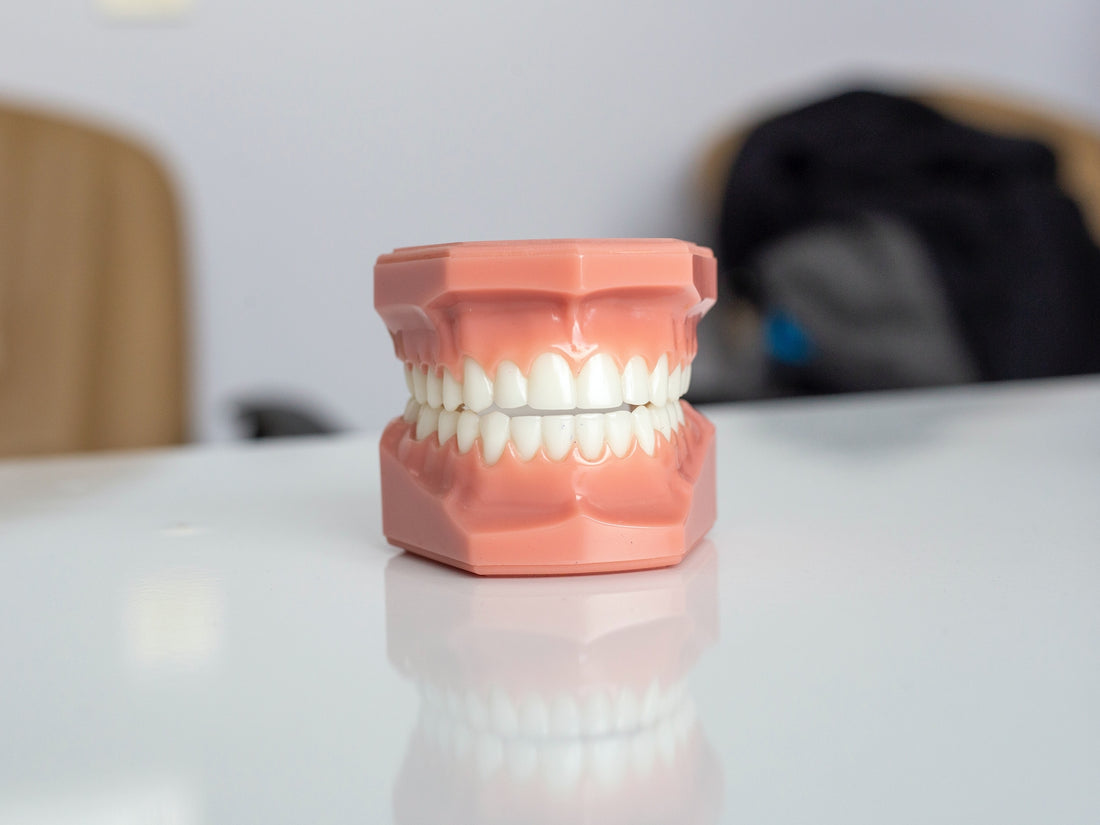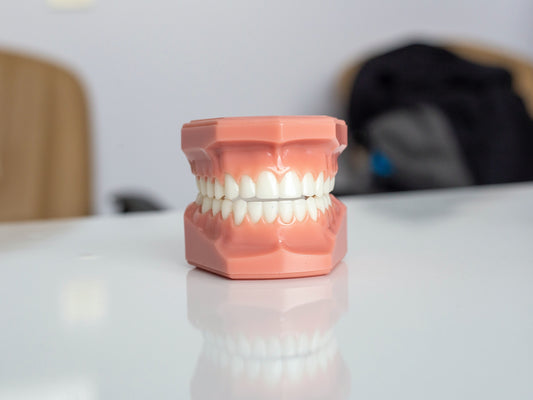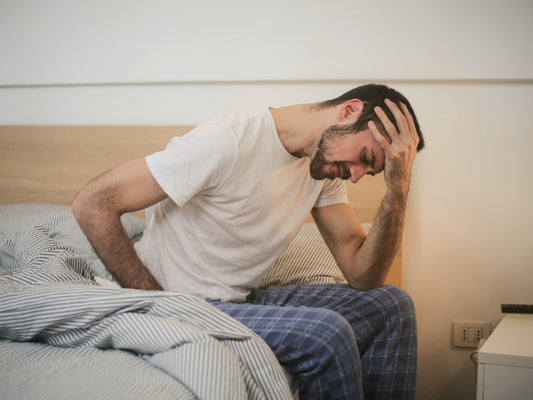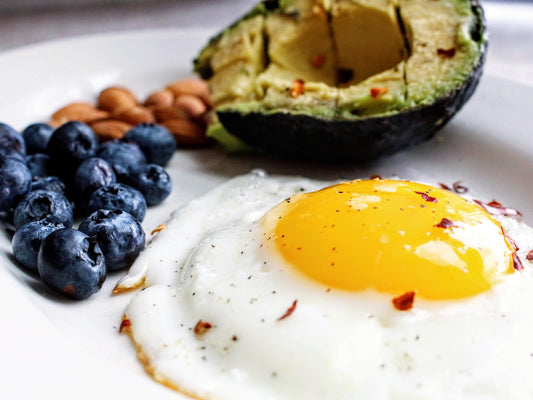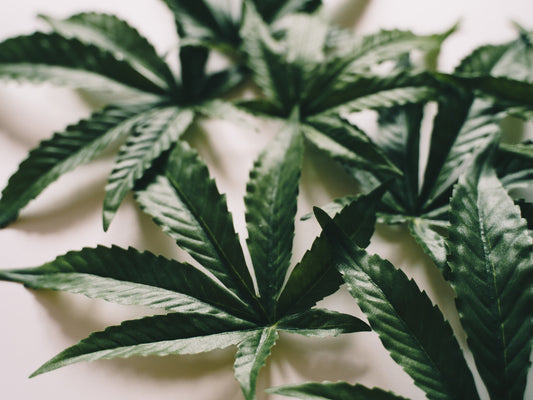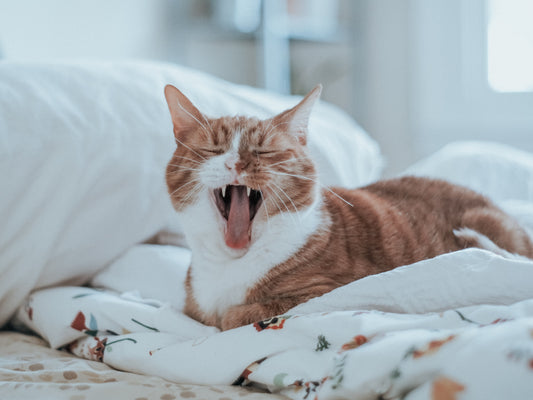What Is Bruxism?
Bruxism, the medical term for teeth grinding, is a condition in which a person grinds, gnashes, or clenches their teeth involuntarily. Bruxism is common at night, when sleeping, so the person may not be aware that they suffer from it. Some other times, teeth grinding can also happen during the day, when the person involuntarily clenches their jaw.
Sleep bruxism is often associated with other sleeping disorders, such as snoring or sleep apnea [1]. Most people grind their teeth occasionally, which doesn’t necessarily cause harm. However, if done on a frequent basis, bruxism leads to damaged oral health.
The consequences of teeth grinding can be very severe when left untreated [2]. These may include fractured or loosened teeth or even tooth loss. Chronic bruxism can wear down teeth, so you may need crowns, root canals, implants, or even complete dentures.
In most cases, people who grind their teeth at night are completely unaware that they do so. Sleeping partners are often the ones that hear the noise of teeth grinding at night. Apart from this, there are several other symptoms of teeth grinding.

Other symptoms include [3]:
- Dull headaches when you wake up, often radiating from the temple
- Earache-like pain
- Tooth pain or sensitive teeth
- The enamel of the teeth is worn down
- Teeth may start to get flat, fractured, chipped, or even become loose
- You wake up with a tired jaw or jaw muscles feel tight
- Your shoulder, neck face, or back may be sore when waking up
- Locked jaw when waking up (difficulty opening your jaw)
- Your jaw joint is popping or clicking
- You wake up with a toothache
- Bite marks on teeth or tongue
During your awake hours, if you notice that you automatically clench your teeth when you are stressed or nervous, it may indicate that you’re suffering from bruxism. However, these are just medical guidelines that may suggest that you suffer from this condition. For an accurate diagnosis, you need to book an appointment with your dentist, who will examine your teeth for damage. Such damage includes visible wear on your teeth, cracked enamel, broken teeth or fillings, and TMJ (temporomandibular joint) disorders [3].
Can Dehydration Cause Teeth Grinding?
In short, there is evidence showing that dehydration leads to teeth grinding [4] and it was proven that dehydration can worsen bruxism. Most people grind their teeth from time to time, even unconsciously, but this doesn’t lead to major consequences unless it gets more frequent. Dehydration can worsen teeth grinding at night, so it can lead to major dental problems.
If you drink alcohol before going to sleep, alcohol interrupts the normal sleep pattern and impacts the neurotransmitters in your brain. This will hyperactivate your muscles, which leads to teeth grinding at night. Dehydration as a result of alcohol consumption, insufficient water intake, or other causes further exacerbates teeth grinding at night.
Other Causes
There are other habits that can worsen these symptoms, as well. In many cases, our habits during the day can lead to teeth grinding at night. Simply chewing gum during the day can lead to bruxism during the night. This is because you get used to clenching your jaw frequently, a habit that remains during the night.

Also, if you have the habit of biting or chewing on a pen, toothpick, or other objects, this may be another reason for teeth grinding at night. People often have this habit when they are focused, anxious, or nervous, and may happen involuntarily.
In addition to this, you are highly likely to grind your teeth if you consume many stimulants during the day. High caffeine consumption may come from sodas (such as cola), chocolate, and coffee. Caffeine is a stimulant that increases muscle activity – including clenching your jaw without noticing.
Smoking can also cause jaw clenching. This is because, just like caffeine, nicotine is a stimulant that impacts the signals your brain sends to your muscles. In fact, smokers are twice as likely to grind their teeth compared to non-smokers [5].
Sleep apnea (snoring) and teeth grinding are also linked [1]. It is unknown how this exactly works, but researchers believe that your body’s stress (airway instability) leads to the brain sending signals to clench the jaw when sleeping.
Finally, people who take medicines like antidepressants, illegal drugs, or psychiatric treatments can alter the brain’s chemical response and neurotransmitters. In turn, this affects muscle response, leading to teeth grinding. In some cases, adjustments to the dosage or the treatment can help eliminate teeth grinding at night.
How to Treat Teeth Grinding
If you are worried that you may grind your teeth – during the night or day – there are a few things you can do to alleviate this condition. Depending on how severe it is, you may need to consult a professional for an official diagnosis and appropriate treatment.
If the symptoms are severe, the best option is to wear a mouth guard until you break this habit. A dental guard is like a cushion between your upper and lower teeth, relieving jaw tension. Also, it helps to protect you against the damages of bruxism, such as worn enamel and teeth chipping.
Other than this, you need to work on your habits and improve overall health to stop teeth grinding.
A Healthy Lifestyle
As discussed above, dehydration can worsen teeth grinding. Staying hydrated all the time is important for many other processes in your body, not just to keep teeth grinding at bay. Apart from watching your daily water intake, you may want to consider adding hydration mixes to your diet. This could also help your body recover after drinking alcohol, so alcohol dehydration won’t worsen your teeth grinding at night.
Other lifestyle aspects that could help you alleviate bruxism include avoiding or cutting down on stimulants, such as coffee, cola, chocolate, and tobacco products, among others. These can intensify bruxism at night.
Become Self-Aware
Try to become more self-aware and notice when or if you grind your teeth during the day. Habits like chewing gum or chewing on pens (and anything that is not food) can lead to bruxism as it gets your jaw muscle used to clenching.
During the day, if you notice you tend to clench your jaw, try putting the tip of your tongue in between your upper and lower teeth. This helps your jaw muscles relax and prevent you from further clenching your jaw.
Relax & Massage Your Muscles

During the day, or right before sleep, you can try relaxation techniques and massage to relax your jaw muscles. If you are anxious, energetic, or tense, you are more likely to grind your teeth at night. This is because bruxism is basically your body’s mechanism to relieve tension. Thus, your body is trying to lower your stress level, and this habit can get worse to the point of permanently damaging or losing your teeth.
Practice Good Sleep Hygiene
People who are tired and stressed are more likely to grind their teeth during the night. Good sleep hygiene helps you rest and feel refreshed the next day. If you are stressed and fatigued, you are more likely to grind your teeth both during the night and day. Some guidelines that you should implement to help you have a good night’s sleep include:
- Practice relaxation techniques before going to bed
- Have a sleep routine in which you go to bed and wake up at the same time every day
- Avoid spending time watching TV or on your smartphone before going to bed
- Make sure there are no lights or electronics in your bedroom
Bottom Line: Can Dehydration Cause Teeth Grinding?
In short, dehydration can worsen teeth grinding at night. This most commonly occurs if you’re dehydrated after drinking alcohol, sports, or other causes. There are also other aspects that can worsen teeth grinding, including stress, fatigue, and the consumption of stimulants. In severe cases, you may have to consult a professional to get help until you can break this habit by changing your lifestyle.
If unchecked, dehydration will not only lead to dental issues as a result of teeth grinding, but also headaches, lower energy levels, and many processes in your body are impacted as a result of being dehydrated. If you smoke or drink alcohol, you are more prone to bruxism and dehydration. Making sure you stay hydrated during the day and after alcohol consumption can help you break the habit of grinding your teeth at night and, consequently, save money on dental work in the future. If you are already grinding your teeth, it’s important to stay hydrated all the time to avoid exacerbating your condition.
References










